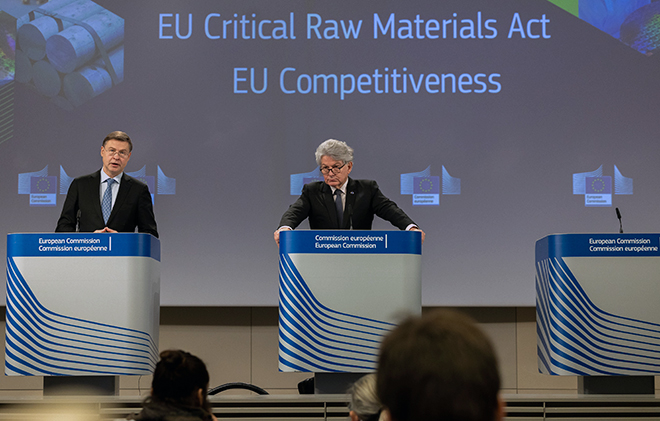Featured Topics
Featured Products
Events
S&P Global Offerings
Featured Topics
Featured Products
Events
S&P Global Offerings
Featured Topics
Featured Products
Events
S&P Global Offerings
Featured Topics
Featured Products
Events
Financial and Market intelligence
Fundamental & Alternative Datasets
Government & Defense
Professional Services
Banking & Capital Markets
Economy & Finance
Energy Transition & Sustainability
Technology & Innovation
Podcasts & Newsletters
Financial and Market intelligence
Fundamental & Alternative Datasets
Government & Defense
Professional Services
Banking & Capital Markets
Economy & Finance
Energy Transition & Sustainability
Technology & Innovation
Podcasts & Newsletters
16 Mar, 2023
By Camellia Moors and Camilla Naschert

| Valdis Dombrovskis, left, executive vice president of the European Commission, and Thierry Breton, commissioner for the Internal Market, at a March 16 press event discussing the European Commission's release of the Critical Raw Materials Act. Source: European Commission Audiovisual Service |
EU officials unveiled a sweeping proposal March 16 that would reduce Europe's reliance on imports for the metals and materials that are essential to the continent's decarbonization efforts.
The Critical Raw Materials Act, or CRMA,
Europe is planning a major renewables drive as part of its REPowerEU plan that will rely heavily on the raw materials identified by the CRMA. Demand for rare earth minerals in onshore and offshore wind turbines, for example, is expected to more than quadruple by 2030 and increase more than fivefold by 2050, respectively, the European Commission said. Batteries for electric vehicles are forecast to drive up demand for lithium elevenfold by 2030 and seventeenfold by 2050.
The CRMA is also part of Europe's Green Deal Industrial Plan reaction to the Inflation Reduction Act in the U.S., which EU members have criticized as "market-distorting" over its investment of nearly $400 billion of public money
"[The CRMA] will significantly improve the refining, processing and recycling of critical raw materials here in Europe. ... And we're strengthening our cooperation with reliable trading partners globally to reduce the EU's current dependencies on just one or a few countries," Ursula von der Leyen, president of the European Commission, said
Boosting domestic capacity
Under the CRMA, domestic
The regulation also sets rules
To reduce the domestic need for new materials, the proposal also boosts recycling by collecting data on the recoverability of critical raw materials from mining waste and setting rules for the collection of equipment with large volumes of critical raw materials.
"The EU has finally got a plan to secure critical minerals supply — the Achilles' heel of the transition," said Ignacio Arróniz, a researcher at E3G, a Brussels-based climate think tank. "For it to work, the EU needs strong partnerships with developing countries. They'll expect a fair share of downstream industries like batteries and renewables."
Avoiding supply chain disruptions, building partnerships
The regulation emphasizes concerns about the reliability of supply chains, especially related to dependence on singular countries for materials or
The proposal tries to diversify supply chains by building international sourcing partnerships.
CRMA directs the European Commission to establish a "critical raw materials club" to facilitate investment in materials supply chains. The club would consist
Many of the sought-after metals are found in developing countries, and Europe competes for mining deals with China.
The CRMA would direct the European Commission to pursue raw materials partnerships with resource-rich nations. Each partnership would identify strategic projects and set tough environmental and social standards in the mining industry.
Thierry Breton, commissioner for the EU's Internal Market, said at a March 16 press conference that while raw material mines present opportunity, they can also bring misery and conflict to some regions. Instead of being a buyer focused on extraction, Breton said, Europe wants to help build up upstream activities that bring economic prosperity as well as infrastructure.
"We want to have a win-win approach," Breton said, adding that heads of state in African countries appeared receptive to this approach in meetings.
To test the security of the EU's existing materials supply chain, the CRMA would also establish a board tasked with monitoring materials markets and their risks, assisting in coordinating strategic projects, facilitating stockpiling agreements, and helping with the establishment of partnerships. The regulation also directs the European Commission and EU members to perform stress tests on the vulnerability of their raw materials supply chains, and some large companies manufacturing technologies would be required to perform audits of their supply chains to identify risks.
The CRMA, as a regulatory proposal, will now head to the European Parliament and the Council of Ministers for amendment and review.
S&P Global Commodity Insights produces content for distribution on S&P Capital IQ Pro.